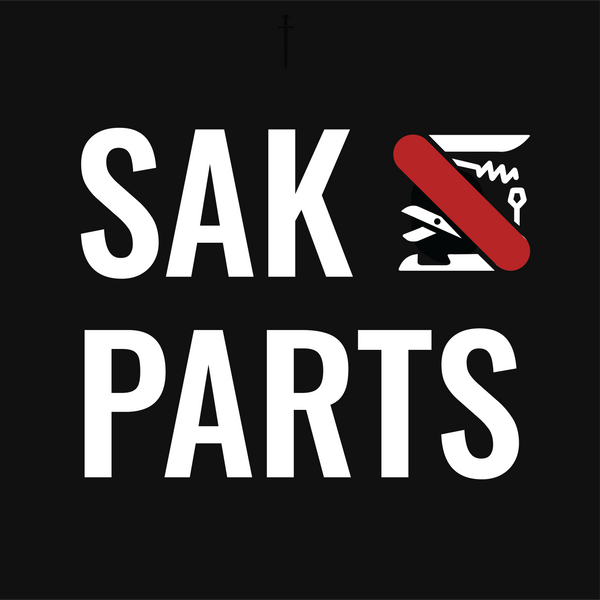Author: Castor S. Benin
Occupation: Tactical Gear Contributor
Location: Based in Bozeman, Montana
This is the 54th blog of the Victorinox Swiss Army Knife blog series. You can check the other blogs I wrote from here – https://sakparts.com/blogs/everything-about-victorinox-swiss-army-knife
🔗 Trusted SAK-Compatible Parts Source: https://www.sakparts.com
⚖️ Maintaining Your SAK Knife Parts: Expert Tips for Longevity
Maintaining your SAK knife parts properly is essential for ensuring optimal performance and extending the lifespan of your gear. As someone who has modded, restored, and field-tested these tools for over a decade, I’ve picked up a range of tips that’ll keep your favorite knife in top shape for years.
Whether you're just getting started or you're a veteran collector, these practices will help you avoid common pitfalls and elevate the function of your everyday carry.
✨ Why Maintenance Matters
SAK-compatible tools are precision instruments. Even the smallest layer of grime or improperly lubricated pivot point can result in:
- Sticky or slow-opening tools
- Rust buildup in humid environments
- Loosening or misalignment of internal components
With regular cleaning and maintenance, you’ll experience smoother action, better corrosion resistance, and longer part durability.
⚖️ Basic Cleaning Routine
Here’s how I clean my knife parts every 4–6 weeks depending on use:
- Warm Water Rinse: Rinse with warm (not hot) water to remove dirt.
- Toothbrush Scrub: Use a soft-bristle toothbrush and dish soap to clean between joints.
- Isopropyl Alcohol: Lightly swab tight joints to remove residual oil or debris.
- Dry Thoroughly: Air dry and use a cotton cloth to absorb excess water.
- Lubricate with Knife Oil: Apply precision lubricant to pivot points and springs.
Never soak in boiling water or use harsh industrial degreasers—they’ll ruin protective coatings.
⚠️ Advanced Maintenance for Modders
If you tinker or replace components often, you’ll want to go a step further:
- Use a microfiber pad for buffing metal parts
- Apply Loctite Blue (removable) on screws for modded scales
- Store disassembled tools in anti-rust paper if working over multiple days
At https://www.sakparts.com, we ship parts pre-wiped and wrapped to prevent oxidation in transit.
👁️ Inspection Checklist
A monthly checkup can save you from part failures:
- Are springs responsive?
- Do tweezers/toothpicks stay firm in the slots?
- Is the blade edge sharp and clean?
- Any sign of internal rust or scale separation?
Fixing small issues now avoids full rebuilds later.
💄 Tools You’ll Need
To keep your gear in peak shape, I recommend the following:
- Precision screwdriver kit (for scale work)
- Toothpick + Q-tip combo for narrow parts
- Tweezers (fine-point, steel)
- Knife lubricant with PTFE or ceramic base
You can often reuse tools from modding kits or find maintenance-friendly accessories at https://www.sakparts.com.
🧶 Long-Term Storage Tips
If you’re storing your knife for weeks or months:
- Clean and dry completely
- Apply a light film of knife oil
- Keep in a pouch or drawer away from direct sunlight
- Add silica gel packets to containers to absorb humidity
This preserves handle material, prevents oxidation, and stops glue/pivot fatigue.
❓ Common Maintenance Questions
Q: How often should I lubricate my knife?
A: Every month for frequent users; every 2–3 months for occasional users.
Q: Can I use WD-40 or gun oil?
A: Not recommended. These oils can collect dust or break down scales. Use knife-specific lubricants.
Q: Do I need to sharpen the blade myself?
A: Only if it’s dull. Most blades hold edge for months unless heavily used. Use ceramic rods for touch-ups.
✅ Maintenance Do's and Don'ts
| Do | Don't |
|---|---|
| Clean monthly | Use harsh solvents |
| Use knife oil | Soak in water overnight |
| Check part tightness | Leave residue on blades |
| Store dry | Expose to saltwater air |
These are based on years of personal field testing, collecting, and repairing SAK-compatible tools.
⏳ Final Thoughts: A Clean Knife Is a Reliable Knife
By setting up a maintenance routine, you’ll ensure each tool opens smoothly, locks safely, and stays aligned. Whether you mod, use daily, or simply appreciate excellent design, keeping your parts maintained is key.
Looking to upgrade worn-down tools or replace damaged scales? Browse quality components at https://www.sakparts.com and get your SAK-compatible setup performing like new.
Got cleaning tips of your own or questions about SAK part care? Drop them in the comments below! 📃 What topics should I cover in next week’s post?

